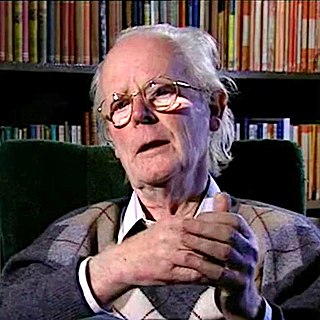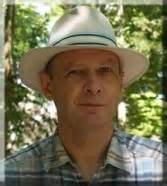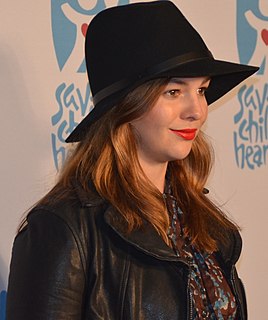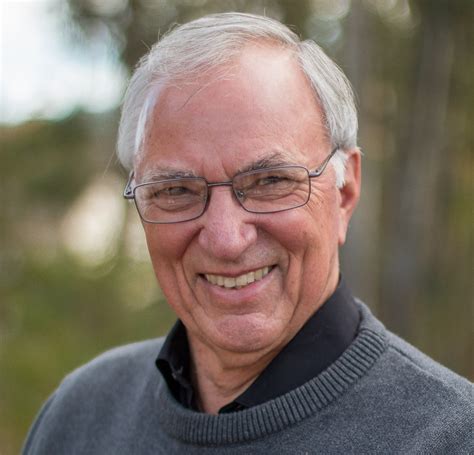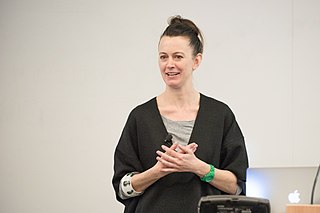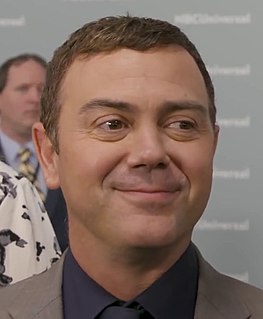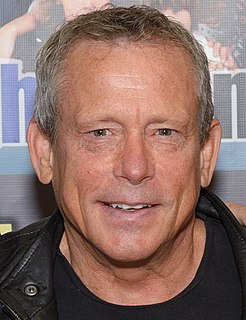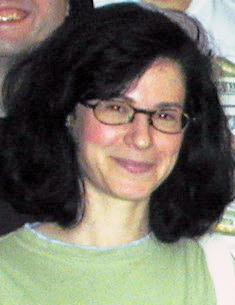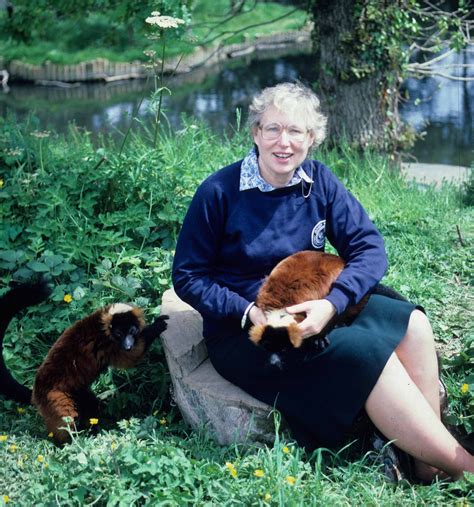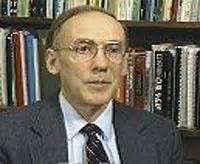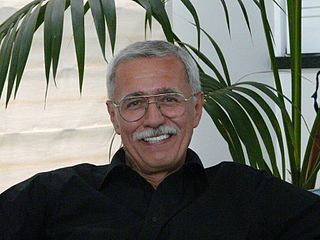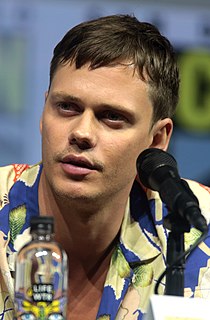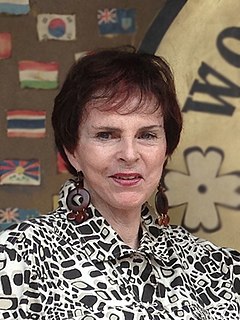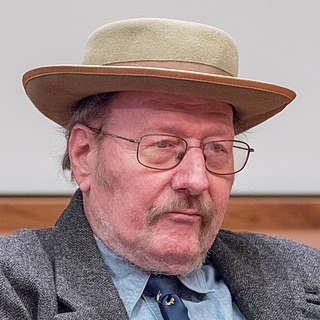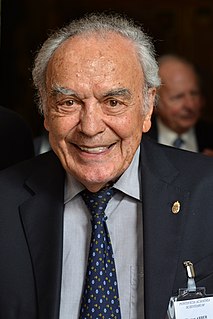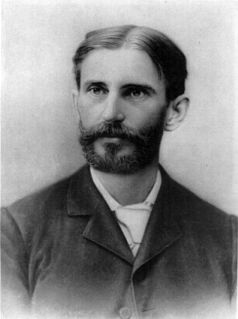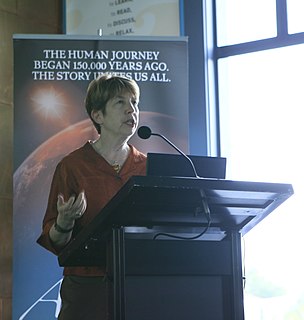Top 112 Biologist Quotes & Sayings - Page 2
Explore popular Biologist quotes.
Last updated on November 8, 2024.
There was an op-ed piece in The New York Times by an evolutionary biologist or somebody - which was a curious place for the opinion to come from - and he said that there's no such thing as a completely free, uncensored medium, that people censor themselves all the time, in deference to hurting other people's feelings, or offending other groups, or in their own, not to provoke a fight. And you do self-censor certain things, and it's not necessarily a bad thing. That's just the way human social interaction works.
This argument [that life is too improbable to have arisen by chance] comes up repeatedly: its latest manifestation is Hoyle's discussion of the likelihood of a wind blowing through a junkyard assembling a Boeing 707 [sic]. What is wrong with it? Essentially, it is that no biologist imagines that complex structures arise in a single step.
Just imagine the banner headlines if a marine biologist were to discover a species of dolphin that wove large, intricately meshed fishing nets, twenty dolphin-lengths in diameter! Yet we take a spider web for granted, as a nuisance in the house rather than as one of the wonders of the world. And think of the furore if Jane Goodall returned from Gombe stream with photographs of wild chimpanzees building their own houses, well roofed and insulated, of painstakingly selected stones neatly bonded and mortared! Yet caddis larvae, who do precisely that, command only passing interest.
.. the word ecology, coined by the German biologist and philosopher Ernst Haeckel (initially as oecology) in 1866. derives from the Greek oikos, "referring originally to the family household and its daily operations and maintenance." The term ecology is therefore intended to refer to the study of the conditions of existence that pertain to, and the interactions between, all the entities that make up our larger, cosmic household here upon earth.
I have been a biologist for a long time, and I hope I never stop getting shivers in my spine when I think about the beauty of how we come to know things in biology. Biologists make predictions, then they go out into the field or the lab to see if their predictions hold up. When hundreds of predictions of this sort are fulfilled, a theory reaches the point where it becomes certain, at least on a broad level. And that is where we are with evolution.
As an evolutionary biologist, I have learned over the years that most people do not want to see themselves as lumbering robots programmed to ensure the survival of their genes. I don't think they will want to see themselves as digital computers either. To be told by someone with impeccable scientific credentials that they are nothing of the kind can only be pleasing.
As for memes, the word 'meme' is a cliche, which is to say it's already a meme. We all hear it all the time, and maybe we even have started to use it in ordinary speech. The man who invented it was Richard Dawkins, who was, not coincidentally, an evolutionary biologist. And he invented it as an analog for the gene.
It is so hard for an evolutionary biologist to write about extinction caused by human stupidity. Let me then float an unconventional plea, the inverse of the usual argument. The extinction of Partula is unfair to Partula. That is the conventional argument, and I do not challenge its primacy. But we need a humanistic ecology as well, both for the practical reason that people will always touch people more than snails do or can, and for the moral reason that humans are legitimately the measure of all ethical questions for these are our issues, not nature's.
By profession a biologist, [Thomas Henry Huxley] covered in fact the whole field of the exact sciences, and then bulged through its four fences. Absolutely nothing was uninteresting to him. His curiosity ranged from music to theology and from philosophy to history. He didn't simply know something about everything; he knew a great deal about everything.
Since I was very young I've been fascinated with nature and I actually wanted to be a marine biologist when I was very young. That was a great passion of mine. So I suppose in the off season when I'm not making movies, I became more and more active as an environmentalist trying to be more vocal about issues that I felt were important.
I think that we reject the evidence that our world is changing because we are still, as that wonderfully wise biologist E. O. Wilson reminded us, tribal carnivores. We are programmed by our inheritance to see other living things as mainly something to eat, and we care more about our national tribe than anything else. We will even give our lives for it and are quite ready to kill other humans in the cruellest of ways for the good of our tribe. We still find alien the concept that we and the rest of life, from bacteria to whales, are parts of the much larger and diverse entity, the living Earth.
I grew up down in Florida, and in the Keys, there's this place called Sea Camp which was not unlike Space Camp, except you explored the sea. And so that kind of whetted my appetite for that. But then I ended up swimming in a lagoon full of Cassiopeia jellyfish, and that quickly quashed that desire to be a marine biologist.
Psychohistory, like psychoanalysis, is a science in which the researcher's feelings are as much or even more a part of his research equipment than his eyes or his hands. Weighing of complex motives can only be accomplished by identification with human actors, the usual suppression of all feeling preached and followed by most "science" simply cripples a psychohistorian as badly as it would cripple a biologist to be forbidden the use of a microscope. The emotional development of a psychohistorian is therefore as much a topic for discussion as his or her intellectual development.
I suspect the reason is that most people [...] have a residue of feeling that Darwinian evolution isn't quite big enough to explain everything about life. All I can say as a biologist is that the feeling disappears progressively the more you read about and study what is known about life and evolution. I want to add one thing more. The more you understand the significance of evolution, the more you are pushed away from the agnostic position and towards atheism. Complex, statistically improbable things are by their nature more difficult to explain than simple, statistically probable things.
The job of the linguist, like that of the biologist or the botanist, is not to tell us how nature should behave, or what its creations should look like, but to describe those creations in all their messy glory and try to figure out what they can teach us about life, the world, and, especially in the case of linguistics, the workings of the human mind.
The shelves of many evangelicals are full of books that point out the flaws in evolution, discuss it only as a theory, and almost imply that there's a conspiracy here to avoid the fact that evolution is actually flawed. All of those books, unfortunately, are based upon conclusions that no reasonable biologist would now accept.
Primates stand at a turning point in the course of evolution. Primates are to the biologist what viruses are to the biochemist. They can be analysed and partly understood according to the rules of a simpler discipline, but they also present another level of complexity: viruses are living chemicals, and primates are animals who love and hate and think.
It is my conviction that if any professional biologist will take adequate time to examine carefully the assumptions upon which the macro-evolution doctrine rests, and the observational and laboratory evidence that bears on the problem of origins, he/she will conclude that there are substantial reasons for doubting the truth of this doctrine. Moreover, I believe that a scientifically sound creationist view of origins is not only possible, but it is to be preferred over the evolutionary one.
I don't think I would ever be a doctor, but the reason I majored in science was because you could become a civil engineer, you could become a biologist, you could become a computer scientist - that was the point of it. I had no idea what I wanted to do. In my last two years of high school here happened to be these few scripts that I really responded to. Eventually, I landed the job, and that was something that I felt transcended whatever other people would think of me.
War is a great destroyer. And human history has arrived at a pivotal moment. We can choose a path built on cooperation, where our caring and sharing side uplifts us, or we can continue to embrace a worldview where domination using violence imprisons us in cycles of killing and destruction. I'm a biologist, and war is not genetically fixed. War is a cultural invention. It's time to end this abomination, and this World Beyond War movement is uniquely focused on unifying the human community to create one of the biggest revolutions in history. I'm in. Join us!
As many critics of religion have pointed out, the notion of a creator poses an immediate problem of an infinite regress. If God created the universe, what created God? To say that God, by definition, is uncreated simply begs the question. Any being capable of creating a complex world promises to be very complex himself. As the biologist Richard Dawkins has observed repeatedly, the only natural process we know of that could produce a being capable of designing things is evolution.
I have tried to show why I believe that the biologist is the most romantic figure on earth at the present day. At first sight he seems to be just a poor little scrubby underpaid man, groping blindly amid the mazes of the ultra-microscopic, engaging in bitter and lifelong quarrels over the nephridia of flatworms, waking perhaps one morning to find that someone whose name he has never heard has demolished by a few crucial experiments the work which he had hoped would render him immortal.
So I think as a biologist I would like us to focus on this planet and finding solutions to sustaining humanity, to improving people's lives globally, but doing our absolute utmost to preserve as much biodiversity as we can, knowing that we have already been responsible for the loss of thousands of species.
Psychedelic experience is only a glimpse of genuine mystical insight, but a glimpse which can be matured and deepened by the various ways of meditation in which drugs are no longer necessary or useful. If you get the message, hang up the phone. For psychedelic drugs are simply instruments, like microscopes, telescopes, and telephones. The biologist does not sit with eye permanently glued to the microscope, he goes away and works on what he has seen.
What good men most biologists are, the tenors of the scientific world - temperamental, moody, lecherous, loud-laughing, and healthy. Your true biologist will sing you a song as loud and off-key as will a blacksmith, for he knows that morals are too often diagnostic of prostatitis and stomach ulcers. Sometimes he may proliferate a little too much in all directions, but he is as easy to kill as any other organism, and meanwhile he is very good company, and at least he does not confuse a low hormone productivity with moral ethics.
Brandeis is so fast and loose and informal, I didn't have any problem offering a history course as a biologist. The barriers would be far more formidable, unscalable, at other institutions. But this is a user-friendly place. It's 'Shmedrik University' - that's a Yiddish word for even worse than schlemiel.
I would love to be a field biologist. I would love to do what Jane Goodall did, just totally immerse myself in the life of one specific species for years and study every aspect of its behavior until little by little, all of these patterns become clear. That would be great, but I don't know if I have it left in me.
I became an actor at a very young age, but I also had a deep respect for nature and I think I was sort of a little biologist when I was younger. I watched documentaries on rainforest pollution and the loss of species and habitats for animals around the world. It affected me in a very hardcore, emotional way when I was younger. So, later in life I wanted to continue that path more and investigate and learn more about ecological issues.
Addressing the conclusions of The God Delusion point by point with the devastating insight of a molecular biologist turned theologian, Alister McGrath dismantles the argument that science should lead to atheism, and demonstrates instead that Dawkins has abandoned his much-cherished rationality to embrace an embittered manifesto of dogmatic atheist fundamentalism.
We naturally assume that our mental structures are universal. But I suppose an outside biologist looking at us would see something very different. He would see that, like other organisms, we have a narrow sphere within which we are very good, but that sphere is very limited. And that, in fact, the very achievements we can have within that sphere are related to lack of achievements in other spheres.
A biologist, if he wishes to know how many toes a cat has, does not "frame the hypothesis that the number of feline digital extremities is 4, or 5, or 6," he simply looks at a cat and counts. A social scientist prefers the more long-winded expression every time, because it gives an entirely spurious impression of scientificness to what he is doing.
Although a biologist, I must confess I do not understand how life came about... I consider that life only starts at the level of a functional cell. The most primitive cells may require at least several hundred different specific biological macro-molecules. How such already quite complex structures may have come together, remains a mystery to me. The possibility of the existence of a Creator, of God, represents to me a satisfactory solution to this problem.
The attitude of the true scientist towards the real limits of human understanding was unforgettably impressed on me in early youth by the obviously unpremeditated words of a great biologist; Alfred Kuhn finished a lecture to the Austrian Academy of Science with Goethe 's words, "It is the greatest joy of the man of thought to have explored the explorable and then calmly to revere the inexplorable." After the last word he hesitated, raised his hand in repudiation and cried, above the applause, "No, not calmly, gentlemen; not calmly!
A high place of honor, although doubtless one to be obtained only after enduring the pangs of a prolonged crucifixion, awaits that philosophical biologist, or that philosopher sufficiently acquainted with scientific biology, who subjects the modern doctrine of evolution to a thoroughly critical analysis, with a view to detect and to estimate its metaphysical assumptions.
There is not a moral to every story in animal behavior. Sometimes a snake is just a snake, and sometimes snake sex is only about sex in snakes, or sex in egg-laying reptiles. Although a biologist's job in part is to interpret what organisms do in a broader context, that context does not, and should not, need to include a lesson for human beings. This is true regardless of whether the lesson is something we would like to teach, which means that using animals as vehicles for nonsexist thinking is just as out of bounds as using them to keep women barefoot and pregnant.


